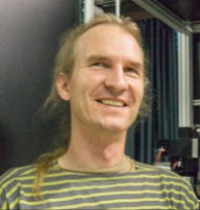
Albrecht Haase
 Associate professor
Associate professor
Department of Physics
|
|
Education |
|
2005 PhD in Physics, University of Heidelberg, Germany 2000 Diploma in Physics, Freie Universität Berlin, Germany 1999 - 2000 External Diploma thesis in the group of Jörg Schmiedmayer/Anton Zeilinger, University of Innsbruck, Austria |
|
|
|
Academic career and teaching activities |
|
since 2020 Associate Professor, Department of Physics, University of Trento, Head of the Neurophysics and Biophotonics Laboratory since 2013 Member of the Center of Mind/Brain sciences (CIMeC), Head of the Neurophysics group 2017 - 2020 Assistant Professor (RTDb), Department of Physics, University of Trento 2012 – 2017 Assistant Professor (RTDa), Biophysics and Biosignals group, Dept. of Physics, University of Trento 2008 – 2012 PostDoc, Biophysics and Biosignals group of Renzo Antolini, BIOtech, University of Trento 2005 – 2008 PostDoc, Quantum Optics group of Jürgen Eschner at ICFO, Barcelona, Spain 2005 PostDoc, Quantum Optics group of Jörg Schmiedmayer, University of Heidelberg, Germany |
|
|
|
Research interests |
|
Neurophysics, Quantum biology, Neural network dynamics, Multi-photon imaging, Olfaction, Magnetoperception, Insect models |
|
|
|
Research work |
|
Nonlinear bioimaging The workhorse of our research is a state-of-the-art bioimaging facility at the Manifattura in Rovereto, at new campus of CIMeC. We use this to image morphology and function of brain models via multi-photon excited fluorescence and higher harmonic generation microscopy. Actual research projects are concerned with: Neuronal network dynamics We use models like the honey bee for fundamental studies of signal processing in intermediate size neural networks. The bee with its less than a million neurons and yet highly developed cognition and learning capabilities is an ideal model. Its brain size of approximately 1mm3 allows almost complete optical access thanks to the high penetration depth of two-photon microscopy. Combined morpho-functional in vivo imaging allows studying spatial and temporal signal processing of external stimuli and the dynamics of the processing networks. Odour coding, network connectivity, optogenetic production of artificial stimuli Questions of special interests are potential quantum-biological mechanisms in primary odour reception, the odour coding and processing network, learning and memory, and effects of neurotoxic pesticites. Beyond that we use molecular biological methods to express optogenetic actuators within the primary olfactory network. Via stimulating single nodes and read out others, we will obtain the functional connectome of the network. By optogenetic excitation via designed light patterns, odour stimuli will be imitated and artificial memory created. Visual information processing and the quantum-biological model of magnetoreception We are developing a setup to also study the neuronal response patterns of insect models to visual stimuli. Besides the question of visual information coding and processing we are interested in a potential modulation of visual stimuli by external magnetic fields as suggested by experiments in birds and corresponding quantum-biological models. Read more on: https://r.unitn.it/en/cimec/nphys |
|
|
|
Memberships in societies and scientific committees |
|
German Physical Society (DPG) Italian Physical Society (SIF) Italian Society of Neuroscience (SINS) Italian Society for Experimental Biology (SIBS) European Chemoreception Research Organization (ECRO) Federation of European Neuroscience Societies (FENS) Honeybee research associations EurBee and COLOSS |
|
|
|
Awards and honours |
|
2016 Habilitation in Experimental Physics (FIS/01) 2018 Habilitation in Applied Physics (FIS/07) |
|
|
|
Attachments |


